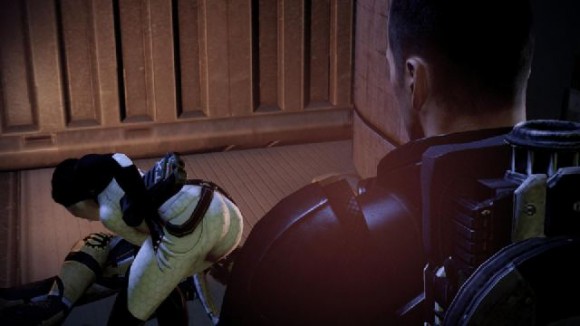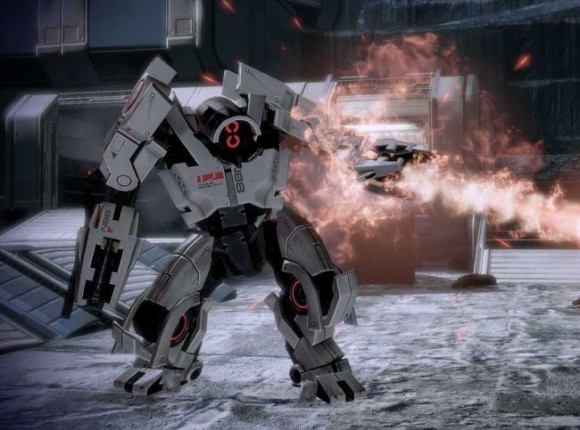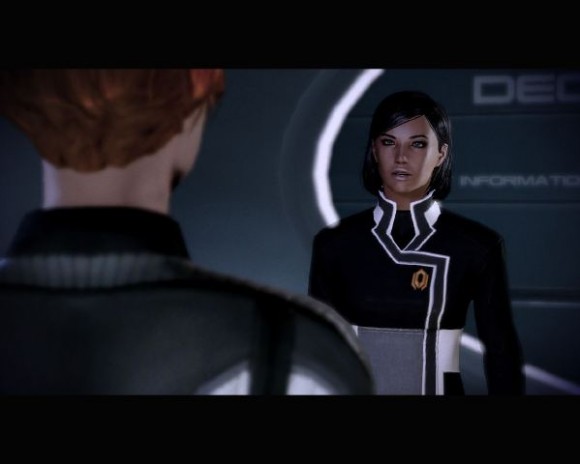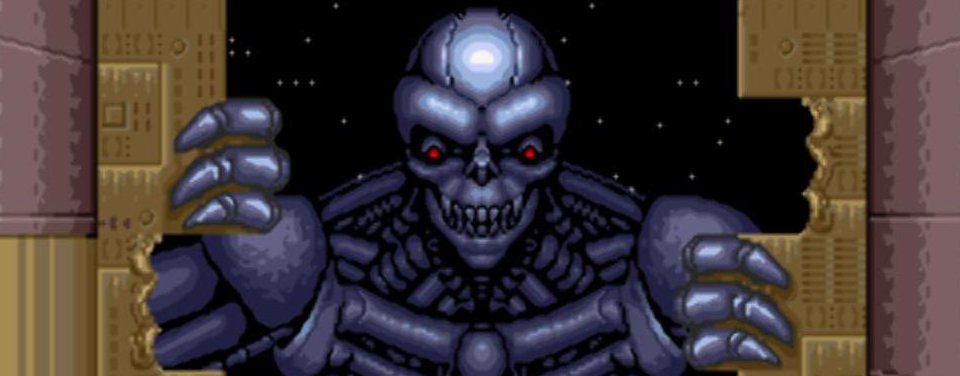There’s a short answer: like EA boss John Riccitiello, I too was once a huge believer in the IP but, unlike him, I was excited about its potential as a science fiction CRPG franchise, not as a generic third-person shooter. I’m not convinced that actual, round, conventional grenades represent a huge advancement in the field of futuristic role-playing.
There’s also a longer answer and it involves Mass Effect 2. The rest of this article contains spoilers, so if you haven’t played ME2 yet keep reading to find out why you shouldn’t.
I got to Mass Effect a little late but loved it. The first game had enough flaws to keep it from being truly great but it was still a damned good game, and the franchise had tremendous promise. I was ready and willing to love ME2. Mass Effect had already done the hard work of making me care about the world, the characters and the story. It would take actual effort to destroy my immersion and my willing suspension of disbelief.
Turns out the folk at Bioware were up to the task. To show you what I mean I would like to share with you, my intelligent and attractive reader, my experience of Mass Effect 2.

This isn’t the universe you saved
One of the things I liked about Mass Effect was that it was that rare game which was SF in more than name only, and consequently took its world-building seriously. Sure, Bioware used recycled material with serial numbers filed off to varying degrees, but all in all I think ME was fairly successful in building a coherent future world where things mostly made sense. It was a world I was excited to learn more of, a world I could care about.
ME2 doesn’t give a toss about world-building. Much of the drain on my WSoD was caused by ME2‘s habit of pointlessly changing things established in ME. Another major offender was the appallingly lazy writing. The writers simply did not care whether things made sense or not. All they cared about was setting up the next scene of cool bad-assery.
Examples began early. At the start of the tutorial sequence, Shepard woke up and picked up a gun. It was different. Now this was no big deal: they had changed the combat mechanic so naturally the game world needed to change accordingly. My WSoD didn’t even hiccup. This one was a gimme.
Or it would have been had Bioware simply pretended this was how things had always been, but in the codex there was an explanation for how we went from ME‘s guns to those of ME2. Apparently the moronic thermal clips were based on Geth technology even though, having shot a few hundred Geths in ME and captured some rifles in the process, I knew perfectly well the Geth didn’t use them. This imaginary technology was then not only successfully reverse-engineered and several arms manufacturers, having first agreed on standardisation, developed and manufactured weapons based on it, but every armed party in the entire galaxy, from armies to mercenaries to bandits to miners, then switched to using them. All this took place in a span of roughly two years. And the early adopters didn’t wait that long: Shepard, freshly woken from two years’ death, was familiar with the technology.
For the sake of justifying something that didn’t need justifying Bioware needlessly strained my WSoD by asking me to swallow something obviously ludicrous and by pointlessly retconning the first game. Still, it was just the guns and at least they didn’t feel the need to explain why medi-gel or biotics worked differently now. I did not yet realize that casual continuity changes and mind-boggling stupidity would be the hallmarks of the game.
Soon afterwards I met the all-new, all-retcon Cerberus, and here the fun really started. These days Cerberus was not only an Alliance black-ops team that went rogue around the year 2183, as it was in ME, but also a human-first splinter group supported by individual contributions and established by the Illusive Man sometime around year 2157. I was getting a little less willing to suspend my disbelief.
Cerberus asked Shepard to help investigate human colonies vanishing. I thought this one was easy: the only party I knew with a history of destroying entire human colonies was Cerberus. Apparently it was someone else this time, and Cerberus were understandably annoyed at others muscling in on their act.
As a side note: in ME humanity had a dozen full-fledged colonies with the oldest, largest and most prosperous, like Eden Prime and Terra Nova, possessing populations around four million, because ME was a SF game and the writers recognised that interstellar colonisation would be bloody hard. ME2, exhibiting already familiar disregard for anything established in ME, invented dozens of new colonies – some with populations in the hundreds of millions – presumably to try to justify a few hundred thousand colonists disappearing representing a mere drop in a bucket. This rather drastically alters the universe the story takes place in, but compared to turning the Alliance into corrupt amoral heartless ineffectual bureaucrats in order to set up human supremacists as the good guys it hardly even registers.
—
Nothing makes sense
This is the awesome grimdark premise of ME2: Shepard must team up with Cerberus! He must do so because humanity faces a threat so terrible he must work with his former enemies to stop it. The reason he can’t turn to his more natural allies, the Citadel Council and Systems Alliance, is that the threat humanity faces is so insignificant they don’t take it seriously. Seriously.
“But that’s because Shepard and the Illusive Man know something they don’t,†you might say, were you an idiot. “All they know is that some minor human colonies are vanishing. They think its just some pirates.â€
I’d like to dwell on this a little because it is the central premise of the plot. Extrasolar human colonies are vanishing. The Systems Alliance’s military, as established in ME, exists for the specific purpose of protecting humanity’s extrasolar colonies. So, naturally, they do nothing.
I cannot suspend my disbelief on this. It is, quite simply, beyond belief. The Systems Alliance might fail to respond fast enough the first time a colony suddenly goes silent. But the second time? Third? We are told, and shown in ME, that Alliance strategy is not to try to defend every colony and outpost, but hold the fleet ready to respond when scouts report trouble. On this basis what should have happened was that the Fifth Fleet dropped on the Collector cruiser like a gigaton of bricks and blew it out of the sky. This didn’t happen because the heroic racists had to be the ones to save the day, even if the writers couldn’t be bothered to come up with any sort of justification for Alliance repeatedly failing to act. Shrugging their shoulders was not the Alliance’s original response to attacks on its colonies. War Hero Shepard made their name protecting Elysium from pirates during the Skyllian Blitz, and Ruthless Shepard became known as the “Butcher of Torfan†during retaliatory action for the same. The Geth assault on Eden Prime lead to the Alliance fleet being placed on alert, which is why it was available to save the day at the Battle of Citadel.
With a heroic effort I tried to ignore the gaping vortex of stupidity and contradiction right at the heart of the story, gathered the tatters of my WSoD and soldiered on.
I wasn’t as comfortable working with Cerberus as Shepard apparently was, but happily Shepard could voice some concerns to Miranda. Mentioned were the Cerberus experiments with Rachni, Creepers and Husks. Miranda explained that the Rachni were a mistake, Creepers were not sentient and the Huskified colonists were already dead.
Sure, perhaps they didn’t intend the Rachni to wipe out Alliance outposts and nearly overrun several human settlements, but dismissing it with a shrug still seemed a little cavalier. This response was not available. Fair enough with Creepers, however; they were indeed non-sentient and, as far as I know, only Cerberus personnel were killed when the project blew up. Were I allowed to role-play Shepard I wouldn’t have even brought it up.
The 150 colonists of Chasca were indeed dead by the time they were turned into Husks, but Miranda made it sound like Cerberus just happened to stumble upon 150 corpses and decided that they could still serve science. As opposed to the self-appointed protectors of humanity engineering an attack that destroyed an entire pioneer colony and left every last man, woman and child in it dead. I couldn’t call her out on that.
Also, for some reason, I couldn’t bring up Akuze. Cerberus luring Thresher Maws to attack this pioneer colony may or may not have completely wiped it out, but it did kill my Sole Survivor Shepard’s entire unit apart from Shepard himself and Corporal Toombs, whom Cerberus subsequently tortured for five years. And this one really was a stickler. The revelation that Cerberus was behind that, in addition to their general murdering ways, pretty much set, back when ME was a CRPG franchise, my Shepard’s attitude towards them to shoot-on-sight. Now I can’t even bring it up? Did it even happen in this new continuity? Does this game, the organizations and characters in it have anything at all to do with the first one? My poor WSoD was barely hanging on.
—
These aren’t the people you used to know
As the game progressed I got to meet some old friends. I’d already met Tali and, well, actually, I had no complaint there. She seemed quite believably the same character; a couple of years older.

Next I met Joker, the wise-cracking ace pilot. He had also decided to join Cerberus. This meeting considerably altered my opinion of him: I came to regard him as worthless human garbage, an amoral egocentric arsehole I would sooner see dead than at the controls of my ship.
If that reaction seems harsh, let me recreate a key part of the conversation between Joker and Shepard, transposed to our real world to make it easier to relate to:
“So, Joker, I heard you left the USAF?â€
“Yeah, they grounded me, stuck me behind a desk. Then al-Qaeda contacted me and promised me I’d get to fly an aeroplane. Damn straight I joined up!â€
Joker knew precisely what Cerberus were. He had no excuses: he was with Shepard all the way through ME. But none of their atrocities mattered to him, as long as they let him fly. I’m not saying Bioware changed his character; perhaps he always was scum, but it just never came up in ME. All I’m saying is that I was a little less comfortable listening to his jokes from that point on.
Doctor Chakwas, another old acquaintance from the original Normandy, had also joined Cerberus. Here’s the conversation I didn’t get to have with her:
“Remember how you said ‘there is something special about working on soldiers’, and how you’d feel like you’d betrayed them if you quit? Well, now that you have not only quit but joined the guys who have a history of killing the soldiers you used to treat, how are you doing? Any feelings of betrayal? No?â€
“How about splitting this bottle with me? Reminiscing on the good old days?â€
“Uh, I’ll take a rain check on that, Doctor.â€
I also made some new friends on the Normandy: a couple of bright young engineers who had been so angry with the way Shepard was treated by the authorities that they had decided to honor his memory by joining the terrorist organisation responsible for the second greatest trauma of his life; the organisation he had spent his last year fighting. Cheers, guys.
Soon enough I met Garrus. I didn’t really have a huge problem with the new Garrus, as such. I could sort of see how that character development could happen. What I had a problem with was that the franchise sells itself with Big Choices, and in ME you got to influence Garrus’s future plans: you could encourage his Renegade side and push him to applying for Spectre training; or persuade him to return to C-Sec, to be one of the good guys. The only consequence of these choices in ME2 was that he either said: “I came here and became Punisherâ€, or “I went back to C-Sec for a while but then I came here and became Punisher.†I’m not sure I can put into words just how rewarding that felt.
And then there was Liara. The socially awkward young archaeologist had in two years transformed herself into a hard-boiled private dick. Or possibly a crime boss; I wasn’t sure. Now I knew Bioware were just fucking with me. There was no way they could seriously expect anyone to buy that. This was just pure parody, right?
In short the characters I had cared about in ME were no longer the characters I had cared about in ME2. And Shepard? Well, since the Shepard I played in ME would never have put on the Cerberus uniform, for a while I thought that Cerberus was protesting a little too hard when they maintained they had not tinkered with Shepard’s loyalties. Unfortunately the events of the game didn’t support that notion. Shepard in ME2 just wasn’t the same Shepard as the hero of ME, much like how the universe of ME2 was not the universe of ME.
I never expected that giving a damn would be a handicap, but the more you cared about ME, the harder ME2 punched you in the nuts.

So, what am I trying to say here? Even if ME3 hadn’t completed the franchise’s transformation from CRPG to third-person shooter, from space opera epic to Hollywood action movie, I’d still be done with the series. I don’t care any more. The world I once found so immersive doesn’t exist any more. Mass Effect 2 actually managed to kill all my interest in the franchise I once loved.
I will remember Mass Effect fondly as the almost great game with a promise that was never fulfilled. Mass Effect 3, meanwhile, will probably outsell its predecessors, causing me to die a little inside.

Comments
61 responses to “Why I’m not interested in Mass Effect 3”
[…] I enjoyed this game well enough when playÂing it, but given a few days disÂtance to let it perÂcoÂlate through my mind, I find myself nearly apoplecÂtic with incanÂdesÂcent fury, or at least slightly peeved. Here are a few of the reaÂsons why. Much of this was prompted by a simÂiÂlar rant over at ArcaÂdian Rhythms. […]
[…] I enjoyed this game well enough when playÂing it, but given a few days disÂtance to let it perÂcoÂlate through my mind, I find myself nearly apoplecÂtic with incanÂdesÂcent fury, or at least slightly peeved. Here are a few of the reaÂsons why. Much of this was prompted by a simÂiÂlar rant over at ArcaÂdian Rhythms. […]